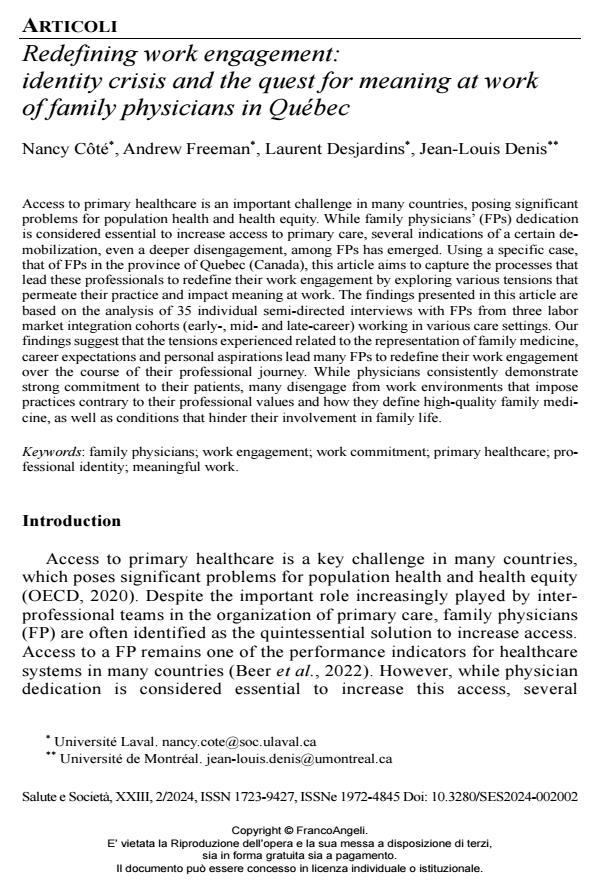Redefining work engagement: identity crisis and the quest for meaning at work of family physicians in Québec
Titolo Rivista SALUTE E SOCIETÀ
Autori/Curatori Nancy Côté, Andrew Freeman, Laurent Desjardins, Jean-Louis Denis
Anno di pubblicazione 2024 Fascicolo 2024/2
Lingua Inglese Numero pagine 16 P. 17-32 Dimensione file 199 KB
DOI 10.3280/SES2024-002002
Il DOI è il codice a barre della proprietà intellettuale: per saperne di più
clicca qui
Qui sotto puoi vedere in anteprima la prima pagina di questo articolo.
Se questo articolo ti interessa, lo puoi acquistare (e scaricare in formato pdf) seguendo le facili indicazioni per acquistare il download credit. Acquista Download Credits per scaricare questo Articolo in formato PDF

FrancoAngeli è membro della Publishers International Linking Association, Inc (PILA), associazione indipendente e non profit per facilitare (attraverso i servizi tecnologici implementati da CrossRef.org) l’accesso degli studiosi ai contenuti digitali nelle pubblicazioni professionali e scientifiche.
Access to primary healthcare is an important challenge in many countries, posing significant problems for population health and health equity. While family physicians’ (FPs) dedication is considered essential to increase access to primary care, several indications of a certain demobi-lization, even a deeper disengagement, among FPs has emerged. Using a specific case, that of FPs in the province of Quebec (Canada), this article aims to capture the processes that lead these professionals to redefine their work engagement by exploring various tensions that permeate their practice and impact meaning at work. The findings presented in this article are based on the analysis of 35 individual semi-directed interviews with FPs from three labor market integration cohorts (early-, mid- and late-career) working in various care settings. Our findings suggest that the tensions experienced related to the representation of family medicine, career expectations and personal aspirations lead many FPs to redefine their work engagement over the course of their professional journey. While physicians consistently demonstrate strong commitment to their patients, many disengage from work environments that impose practices contrary to their professional values and how they define high-quality family medi-cine, as well as conditions that hinder their involvement in family life.
Parole chiave:family physicians; work engagement; work commitment; primary healthcare; professional identity; meaningful work.
- Le système de santé québécois à l’épreuve de la pandémie Nancy Côté, Charles Fleury, in Recherches sociographiques /2025 pp.483
DOI: 10.7202/1121780ar
Nancy Côté, Andrew Freeman, Laurent Desjardins, Jean-Louis Denis, Redefining work engagement: identity crisis and the quest for meaning at work of family physicians in Québec in "SALUTE E SOCIETÀ" 2/2024, pp 17-32, DOI: 10.3280/SES2024-002002